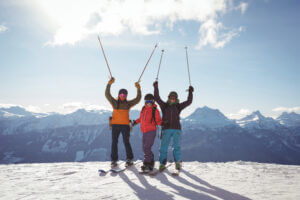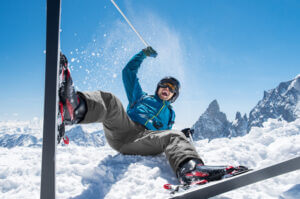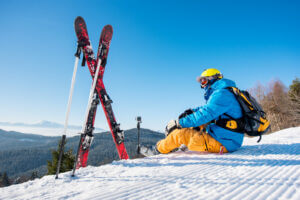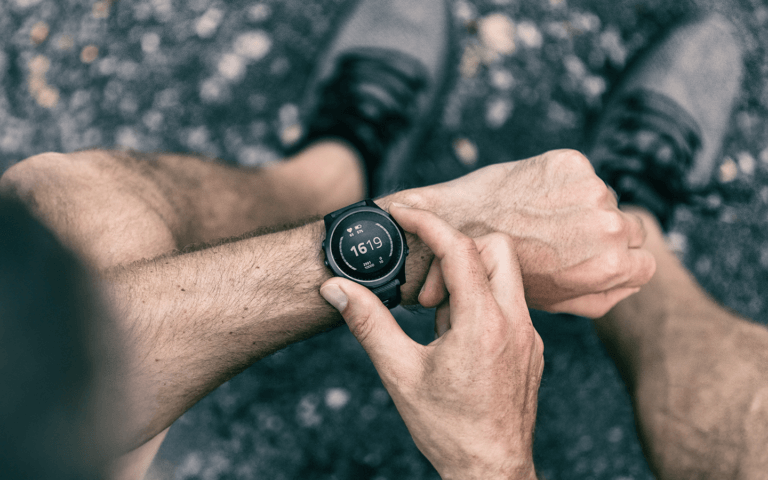With the relaxing of travel restrictions (and fueled with armchair-inspo from the Beijing Winter Olympics), many families will be flocking back to the slopes.
There’s one big difference this year, however, the vast majority will have had a two-year hiatus due to the pandemic. So, no matter how much lockdown walking or WFH Peleton hours we’ve clocked up, we might still be a little rusty on the piste. And for the more mature skier, (two thirds of skiers on holiday are over the age of 45) there’s the unavoidable fact that time marches on – which may have caused health niggles such as joint pain and stiffness to creep in.
Skiing holidays are all about high-octane fun, but there is a more serious side to the pursuit. Whilst winter sports can be fantastic for cardiovascular health, helping to tone and refine muscles, it can put an enormous strain on the body. In addition, the risk of injury (sometimes serious, sadly) means that the slopes should be treated with respect, it’s vital to prepare your body.
Mr Sean Curry, Consultant Orthopaedic and Trauma Surgeon at The London Orthopaedic Clinic at King Edward VII, shares his five top tips for getting into shape for the slopes and most importantly avoiding injury when you’re there:
1- GET FIT-SKI

Whether you are a seasoned skier or a snowboarding virgin, a very important factor to prevent injury is your own personal physical fitness. Injury rates on the slopes increase mid to late afternoon where fatigue is the greatest. So, it’s important to prepare by increasing aerobic capacity, lower limb strength and flexibility. Try a mix of exercise at least six weeks (ideally 12) pre-trip including cycling, running, indoor cardio-equipment such as the rowing machine, swimming, yoga, stretching, plus bodyweight workouts such as lunges and squats. Where possible, it’s also important for you to maintain your ideal weight, to avoid putting more strain on your knees.
Consider a session with a specialist physio or musculoskeletal consultant for some ‘pre-habilitation’. Experts should also be able to give you simple exercises that you can do at home, to help increase thigh strength, to make the first few days on the slopes less risky and more comfortable.
If you suffer from a joint problem, it pays to get medical advice about your treatment options. For joint pain, it may be worthwhile considering a nutritional supplement such as glucosamine. In the longer term, for a chronic condition such as knee osteoarthritis, an orthopedic consultant may recommend a novel treatment such as Arthrosamid®, a single injection that can provide long acting and sustained pain relief and improve mobility.
2- ALL THE GEAR

Having the right equipment (rather than the latest fashion) is vital. Well-fitting boots will help to avoid cold feet, blisters, and shin splints and wearing a helmet is essential to reduce the risk of serious head injury even at lower speeds. Bindings must also be adjusted to allow release when you lose control, because when you fall your ski can act as a long lever and produce large rotational forces resulting in significant ligament damage to the knee and even fractures to the lower limb. Suitable settings for skis and boards are a complex equation of age, ability, height and weight. So, when you’re at the ski hire center, be honest about your weight and height and don’t overestimate your ability!
3- LEAVE THE APRÈS SKI ‘TIL LATER

Cold muscles, tendons, and ligaments are vulnerable to injury such as sprains, strains, and ruptures. To prevent these injuries when exercising, warm up by slowly and gently stretching your muscles. Make sure you repeat these stretches after you’ve come off the slopes – especially if you have a long walk or drive back to your accommodation. Adequate warm-down will also make the following day’s exercise easier on your body. And remember – après ski is named so for good reason! While alcohol seems to warm you up, it actually dilates your blood vessels increasing blood flow to the skin thereby increasing heat loss. Alcohol also slows your reactions and removes inhibitions – so puts you at a greater risk of injury.
4- SKI EASY

When you’ve hit your stride after the first couple of days, it’s easy to overstretch yourself, which can make you more prone to injury. However, if you’re careful and keep within your comfort zone (black runs, icy moguls and off-piste routes should only be attempted by experienced skiers), there are ways to ensure you can ski safely throughout your holiday. Why not:
- Consider lessons: the better your technique, the less chance you will put undue strain on your joints
- Take a rest day: the highest risk of accident is after 3pm1 on the third day of your holiday, because muscle fatigue reaches its peak after 48 hours
- Take the lift at the end of the day: you will be tired, the pistes may be icy and crowded, and there will probably be bare patches in the snow – a perfect recipe for a fall.
5- DON’T IGNORE AN INJURY

If you’re unfortunate enough to suffer injury on the slopes, get medical attention ASAP. Clinics in ski resorts are well versed in treating orthopedic pain and specific injuries. So, it’s important to get the right travel insurance to make sure you’re covered for any treatment you may need when abroad. If your injury isn’t an emergency, but you think you’ve strained a muscle or caused any damage to your joints or bones, it’s important to rest up whilst you’re on holiday and when you get home. Minor sprains and strains can be treated easily at home by following the RICE rule: Rest, Ice, Compression and Elevation. If pain or discomfort persists, get advice from your GP, a physio, or an orthopedic specialist to make sure you don’t cause further damage and to discuss treatment options.
Take your luxury ski escape to new heights with these opulent picks of resorts from around the world in PISTE DE RÉSIDENCE.






